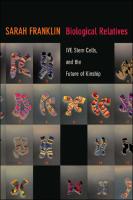Biological Relatives
IVF, Stem Cells and the Future of Kinship
Author(s)
Franklin, Sarah
Collection
Knowledge Unlatched (KU)Language
EnglishAbstract
Thirty-five years after its initial success as a form of technologically assisted human reproduction, and five million miracle babies later, in vitro fertilization (IVF) has become a routine procedure worldwide. In Biological Relatives, Sarah Franklin explores how the normalization of IVF has changed how both technology and biology are understood. Drawing on anthropology, feminist theory, and science studies, Franklin charts the evolution of IVF from an experimental research technique into a global technological platform used for a wide variety of applications, including genetic diagnosis, livestock breeding, cloning, and stem cell research. She contends that despite its ubiquity, IVF remains a highly paradoxical technology that confirms the relative and contingent nature of biology while creating new biological relatives. Using IVF as a lens, Franklin presents a bold and lucid thesis linking technologies of gender and sex to reproductive biomedicine, contemporary bioinnovation, and the future of kinship. This title was made Open Access by libraries from around the world through Knowledge Unlatched.
Keywords
science studies; feminist anthropology; kinship-philosophy; Biology; Embryology; In vitro fertilisation; ReproductionDOI
10.26530/OAPEN_469257ISBN
9780822354994;9780822354857Publisher
Duke University PressPublisher website
https://www.dukeupress.edu/Publication date and place
Durham, 2013Grantor
Imprint
Duke University Press BooksSeries
Experimental Futures,Classification
Politics and government


 Download
Download Web Shop
Web Shop